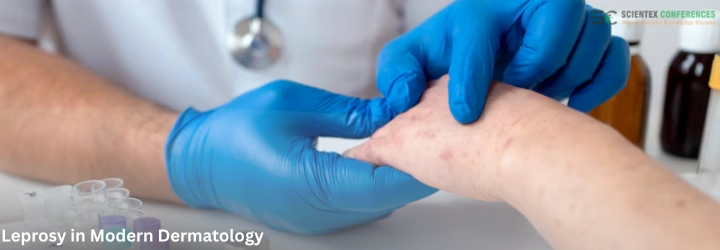Track: Leprosy in Modern Dermatology

Despite being curable and largely controlled in many regions, Leprosy (Hansen’s disease) remains a critical public health concern in certain parts of the world. This session aims to reframe leprosy in the context of modern dermatology—focusing on timely diagnosis, new treatment modalities, social stigma, and post-treatment care. Attendees will explore how dermatologists can lead the way in early detection, management of complications, and reintegration of affected individuals into society.
Early identification of leprosy, especially in atypical and subtle clinical presentations, is crucial for timely intervention and prevention of complications. Advances in diagnostic methods—including skin biopsy histopathology, molecular PCR assays, and the use of immunological markers—have significantly improved diagnostic accuracy and early detection. Innovations in multidrug therapy (MDT) now allow for more patient-tailored treatment plans, accommodating variations in disease severity and addressing emerging cases of drug resistance. Additionally, the effective management of leprosy reactions, both Type 1 (reversal reactions) and Type 2 (erythema nodosum leprosum), is essential due to their dermatologic and systemic implications. Modern approaches to leprosy care emphasize a holistic framework by integrating rehabilitation services, reconstructive surgery for deformities, and mental health support, ultimately enhancing both functional recovery and quality of life for affected individuals.
Digital Dermatology in Leprosy Surveillance:
How telemedicine and mobile-based screening tools are revolutionizing access to care in remote and endemic areas.
Genomic and Immunologic Perspectives:
Investigating host-pathogen interactions, susceptibility genes, and potential vaccine research.
Leprosy in the Migrant and Urban Population:
Understanding the resurgence in non-endemic areas due to global migration and urban poverty pockets.
Role of Dermatologists in Public Education and Policy Advocacy:
Positioning dermatologists as key actors in driving awareness, countering myths, and influencing national programs.
Management of Leprosy-Associated Pigmentary and Neurological Changes:
Techniques to address aesthetic and functional sequelae using cosmetic dermatology and dermatologic surgery.
Interactive Add-ons:
Virtual Skin Lesion Gallery:
A digital showcase where participants can explore high-resolution clinical images of various leprosy types (tuberculoid, lepromatous, borderline, etc.)
Patient Voices Panel:
A recorded or live session sharing real patient stories to humanize the disease and highlight stigma-related challenges.
Live Skill-Building Segment:
Practical steps on performing nerve palpation, slit-skin smear, and counseling on self-care routines.
Case Simulation Lab:
An interactive platform where participants choose diagnostic and treatment steps in virtual patient cases, with immediate feedback from moderators.
Scientific Highlights
- Skin Diseases: Acne, Psoriasis, Dermatitis
- Cosmetic Surgery
- Dermatopathology
- Pediatric Dermatology
- Facelift (Rhytidectomy)
- Aesthetic Medicine
- Plastic Surgery
- Diet & Nutritional Supplements for Healthy Skin
- Oral and Maxillofacial Surgery
- Dermato oncology
- Dermatology
- Trichology and Hair Transplantation
- Vitiligo Treatment
- Rhinoplasty and Otoplasty
- Fungal Skin Infections
- Cosmetology
- Skincare Treatment
- Dermatologic Disorders
- Clinical Trial and Case Reports
- Teledermatology & AI Diagnostics
- Wound Care
- Leprosy in Modern Dermatology
- Onychomycosis
- Regenerative Aesthetics
- Targeted Drug Delivery Systems
- GI Health & Skin


